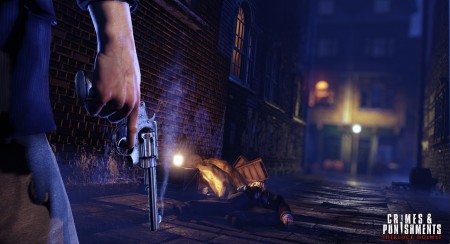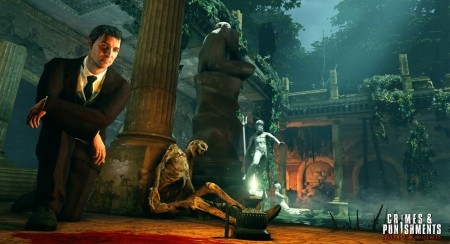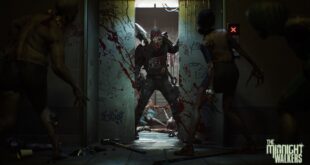The world’s greatest consulting detective is back in a brand new adventure, powered by a brand new engine.

Sherlock Holmes is my favorite fictional character of all time, without a doubt. And I’m happy to say that his extreme intelligence, egotistic personality, strange methods of solving crimes and all his other signature traits are wonderfully depicted in Sherlock Holmes: Crimes and Punishments. Developer Frogwares did a fantastic job with the character of Sherlock Holmes, as well as with Watson and Scotland Yard Inspector Lestrade. I won’t give details of the stories in this review, specifically because each crime you solve in the game is actually one taken from the log of original SH stories by Sir Arthur Conan Doyle (really?! That’s pretty awesome -ed).
We start off as Watson in first person view, running into the main living room of apartment 221B Baker Street (an address I’m sure you all know and love), after hearing gunshots. As he enters the room he sees Sherlock, blindfolded, shooting a revolver into the wall, after a short QTE crossing the room, you grab hold of Sherlock and ask him what he’s doing. It turns out that as a reward for a small crime Sherlock recently solved, the client had given him multiple vases as a reward. Being the way he is, Sherlock could find no better use for them than for blindfolded target practice. Soon after, Inspector Lestrade arrives, and asks you (as Sherlock) to come and help out the police with a mysterious case. This case is the case of Black Peter, a sailor who ended up harpooned to his shed wall.
I won’t talk any more about the story, nor the outcome, (no spoilers!) but I will now get on the the meat of the review. For starters, I love playing as Sherlock Holmes, given relative freedom around not just at the crime scene, but in the entire property where the crimes have taken place. This opened up a lot of possible places for clues and was generally pretty awesome. I disliked however, that even when you see something that is obviously a clue, it’s hard to pick up or examine, as you have to have the mouse in the exact right spot to be able to check it out. Some time will also be spent talking to people, and examining them by watching not only their body language, but also slowing down time and examining different parts of them (things like dirty clothes, recently removed wedding bands, nervous sweat, expensive/poor clothes… things like that).

Also, to help solve crimes, every time you find a clue, you enter something comparable to the “mind palace” in BBC’s modern adaption. This is where you connect clues to help form different possibilities of what could have happened, leading up the the multiple choice ending at the final part of each mystery. This would be wonderful, except there is no penalty for connecting the two wrong clues, which can sometimes leave people (well, people like me) slapping everything together until a new hypothesis is created. It doesn’t make feel clever, it just feels sort of patronizing.
With everything I just talked about, it sounds like the game should be nearly the perfect example of what a great detective game should be right? Well… it’s not. Excluding bugs even, the game is not quite as in-depth as it originally appears to be. The most glaring issue I had with it? Too much lack of consequence. While too many consequences can ruin a game experience, too few can very nearly do the same. If I can make the wrong choice and get away with it with no penalty, I don’t feel too obligated to try very hard; would you? That’s not saying I didn’t try, mind you, I did the first time, until the end of the case actually, when I realized the immense lack of, well, punishment.
Aside from the low amount of consequence, another fairly large problem I had was the fact that, more often than not, I over-thought the problem. I read into body language, generally thought too deep for motive, and even reenacted some scenes in my head which caused me to miss the true outcome. Sometimes I had even noticed what ended up being the ‘aha’ answer almost immediately on a case, but it felt too obvious at the time to be correct.
Now, excluding the problems I just spoke about, there are a few more issues that I had. Namely, I had some problems with the camera.
The camera, simply put, is a mess. Controlling Sherlock felt extremely floaty in third-person. And I would have played in first-person mode if the camera didn’t have an odd shuttering effect when you move around too fast, so both methods of play have their issues. I’m sure it was unintended, not so much an actual flaw in design, so I can let it slide… though it did actually give me motion sickness.
Glitches were uncommon actually. I only encountered one ”Sherlock, trains can’t disappear in the fog! It’s impossible.”, said Watson, his legs glitched into the ground, so that he was half buried. “Neither is it possible to bury yourself thigh deep in the ground in not so much as a moments notice, but look at that achievement, Watson!” I replied, through tears of laughter.

Final Thoughts
While I listed many issues I had with the game, I still have to say that I very much enjoyed my time with Crimes & Punishments. Actually, I liked it so much I’ll undoubtedly play it again and again even after this review is done.
I genuinely had fun playing, which is a very good thing. Bad camera and simplified, inconsequential puzzles or not, I had a great time with Sherlock Holmes: Crimes and Punishments and I highly suggest it to anyone who thinks they may be interested. It’s definitely not perfect, but it wasn’t a high budget game, so I didn’t expect it to be. I probably wouldn’t pay full price for it either, but if you can find it on sale and you don’t have much going on, it’s absolutely worth about 30-40 dollars.
 BrutalGamer Bringing you Brutally Honest feedback from today's entertainment industry.
BrutalGamer Bringing you Brutally Honest feedback from today's entertainment industry.





